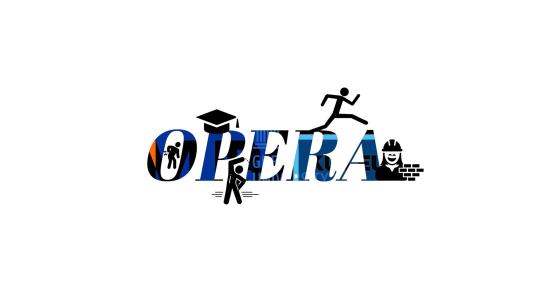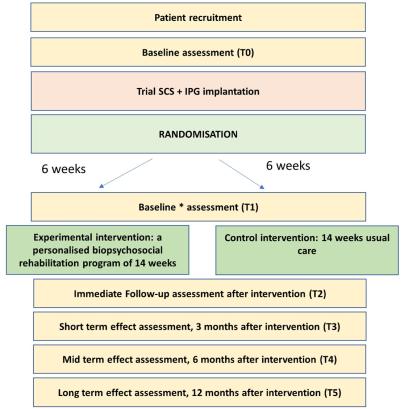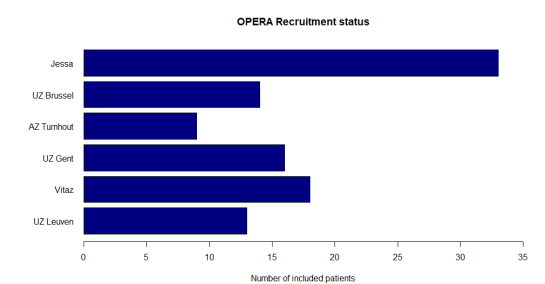
OPERA consortium
- Prof. Dr. Maarten Moens (VUB/UZB, Principal Investigator)
- Prof. Dr. Lisa Goudman (VUB)
- Prof. Dr. Koen Putman (VUB)
- Prof. Dr. Dominique Van de Velde (UGent)
- Prof. Dr. Lode Godderis (KU Leuven)
- Prof. Dr. Ann De Smedt (VUB/UZB)
- Dr. Bert Van Puyenbroeck (VUB)
- Dra. Olivia Lavreysen (KU Leuven)
- Drs. Jonas Callens (VUB)
- Drs. Dries Ceulemans (UGent)
Participating centra
-
UZ Brussel
-
UZ Gent
-
AZ Turnhout
-
Jessa Ziekenhuis
-
Vitaz
-
UZ Leuven
Study flowchart
A total of 112 patients will be included in OPERA. In order to make the comparison between patients in the individualized rehabilitation program and patients in the usual care program, six assessments will take place: before the trial implantation, before the assigned treatment, after treatment and at 3, 6 and 12 months after treatment.

- Protocol paper of the OPERA study: read here.
- Concept analysis with the essential elements of a biopsychosocial rehabilitation program for return to work: read here.
- Can we change work participation through rehabilitation programs? Read it here.
Contact
Please contact OPERA.RCT@gmail.com for more information about this trial.
This study received funding from the Research Foundation Flanders through the FWO-TBM call.

Project overview
Even though Spinal Cord Stimulation (SCS) serves as an effective treatment to make the pain more manageable, research indicated that only 30% of these patients return to work. Work resumption is an important goal to achieve. In addition to assuring a reliable income, work can contribute greatly to the recovery phase, guarantees integration into the society and allows patients to maintain social contacts. In addition, returning to work can provide structure and a more meaningful way to spend one’s days, helps build self-confidence and improves overall quality of life. A multicenter randomized controlled trial will be conducted to evaluate whether the ability to work in Persistent Spinal Pain Syndrome Type II (PSPS-T2) patients after SCS implantation is different after a personalized biopsychosocial rehabilitation program specifically targeting return to work (RTW) compared with usual care. |
The primary scientific objective is to examine whether the ability to work in PSPS-T2 patients after SCS implantation is different with a personalized biopsychosocial rehabilitation program specifically targeting RTW, compared to usual care. The secondary objective of the study is to examine if a personalized biopsychosocial rehabilitation program specifically targeting RTW, compared to usual care, is different in improving functional capacity, improving work status and participation, obtaining pain relief, increasing health-related quality of life, increasing functioning and physical activity, improving sleep quality, decreasing kinesiophobia, increasing self-management, decreasing anxiety and depression and decreasing healthcare expenditure.
Participants randomly allocated to the usual care intervention will undergo the usual care trajectory. Participants randomly allocated to the personalized biopsychosocial return to work program will receive an individualized 14-week rehabilitation program. Therapy is provided at each implantation centres and will start 6 weeks after definitive SCS implantation. Within a 14-week period, patients in this group receive treatment sessions from trained physiotherapists, occupational therapists and psychologists.
This study has received funding from the Research Foundation Flanders (FWO), Belgium.
Study interventions
personalized biopsychosocial return to work program
The 14-week intervention program consists of 30 sessions: two sessions of pain education provided by a psychologist with one booster session of pain education halfway through the program, one online nutrition module, 20 sessions provided by a physiotherapist, five sessions provided by an occupational therapist, and two sessions mapping specific work requirements as well as intermediate measurement of physical capacity.
The psychotherapeutic sessions focus on pain education and give an introductory session on work resumption. The online module on nutrition provides advice, support and tools for a healthy diet.
During the physical therapy, a patient-chosen activity is built up according to the principles of Graded Activity. In addition, mobilising, proprioception, stabilisation, muscle strengthening, aerobic and stretching exercises are practised. These sessions are specifically tailored according to the patient’s work context and based on the patient’s physical abilities in relation to the work requirements.
In the course of the occupational therapy sessions, information about living with a neurostimulator, energy and activity management, sleep, self-efficacy, etc. is provided. In addition, advice is given about postures and movements within the patient’s specific work context. Finally, a session on information and tools concerning the process of returning to work is given.
Usual care trajectory
Patients assigned to the usual care trajectory will receive the current postoperative care of the corresponding centre. This may differ between centres, for example, from in-patient rehabilitation, rehab within primary care or no rehabilitation after the definitive implantation of the neurostimulator.
Study status
On behalf of the entire STIMULUS team, we would like to wish you all the best for 2026!

At the start of the new year, a total of 103 participants have been included. When adding the participants with a planned inclusion in January and February, this number increases to 107.
This means that we are only five inclusions away from reaching our target sample size of 112 and completing the recruitment phase.
